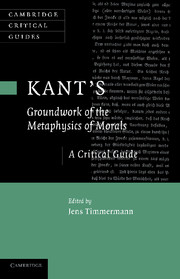Book contents
- Frontmatter
- Contents
- List of contributors
- List of translations and abbreviations
- Introduction
- 1 Ethics and anthropology in the development of Kant's moral philosophy
- 2 Happiness in the Groundwork
- 3 Acting from duty: inclination, reason and moral worth
- 4 Making the law visible: the role of examples in Kant's ethics
- 5 The moral law as causal law
- 6 Dignity and the formula of humanity
- 7 Kant's kingdom of ends: metaphysical, not political
- 8 Kant against the ‘spurious principles of morality’
- 9 Autonomy and impartiality: Groundwork III
- 10 Problems with freedom: Kant's argument in Groundwork III and its subsequent emendations
- 11 Freedom and reason in Groundwork III
- Bibliography
- Index
11 - Freedom and reason in Groundwork III
Published online by Cambridge University Press: 04 August 2010
- Frontmatter
- Contents
- List of contributors
- List of translations and abbreviations
- Introduction
- 1 Ethics and anthropology in the development of Kant's moral philosophy
- 2 Happiness in the Groundwork
- 3 Acting from duty: inclination, reason and moral worth
- 4 Making the law visible: the role of examples in Kant's ethics
- 5 The moral law as causal law
- 6 Dignity and the formula of humanity
- 7 Kant's kingdom of ends: metaphysical, not political
- 8 Kant against the ‘spurious principles of morality’
- 9 Autonomy and impartiality: Groundwork III
- 10 Problems with freedom: Kant's argument in Groundwork III and its subsequent emendations
- 11 Freedom and reason in Groundwork III
- Bibliography
- Index
Summary
Section III of Kant's Groundwork has achieved near legendary status as the murkiest of his writings on ethics, comparable perhaps to the ‘Transcendental Deduction of the Categories’ in the Critique of Pure Reason. This chapter will offer a way to cut through the murky material that differs from most in two ways. First, I will work my way from the end of Groundwork III with Kant's final explanation of his solution and its limitations, back to his specification of the key to the solution, and finally back to the identification of the problem itself. Secondly, I will present an interpretation, which I call the ‘validation of reason’ interpretation, that centres on the role of reason as legislator of the moral law rather than on any choice in the will.
THE STANDARD INTERPRETATION
A standard approach to Groundwork III is to view Kant as attempting to provide an argument for the validity of the moral law for human beings by invoking a theoretical argument borrowed from the Critique of Pure Reason about the nature of reality. This theoretical argument is taken to invoke transcendental idealism to show that human beings are not merely sensible beings but are also members of another ontological order, the ‘intelligible’, that grounds the sensible world. As members of the intelligible world, human beings are active and rational, able to initiate action independent of causal determination in the sensible world, that is, as things in themselves they possess a free will understood as an ability to choose.
Keywords
- Type
- Chapter
- Information
- Kant's 'Groundwork of the Metaphysics of Morals'A Critical Guide, pp. 203 - 223Publisher: Cambridge University PressPrint publication year: 2009
- 4
- Cited by

